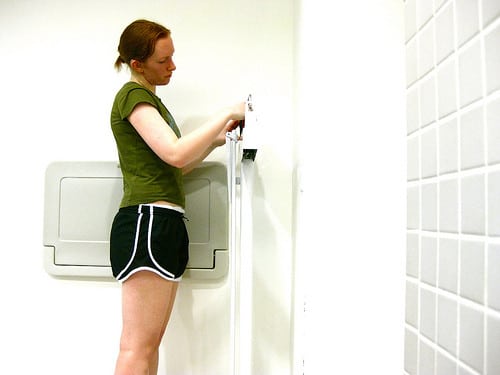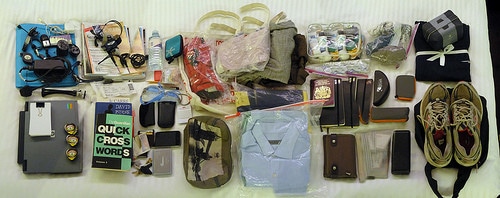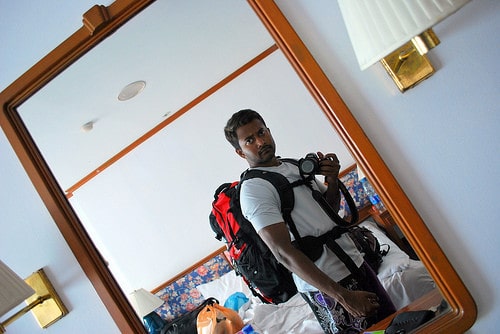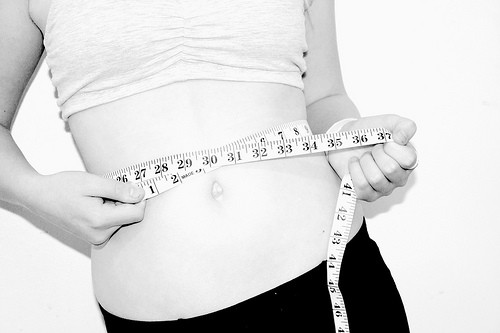Backpacks tend to gain weight over time because their human owners get less diligent about keeping them packed light and efficiently. The longer a given trip is the more stuff that’s going to fill your backpack’s “waistline” – and you might not even notice. That is until your backpack explodes like a pipe bomb the next time you try to find your socks or you pull a back muscle.

Backpacks, like people, need to go on diets from time to time – or better yet, try and watch their weight over the long run. Lightening up your backpack isn’t difficult; it’s a matter of getting back to basics and what you probably already know.
Lay It All Out
You’ll underestimate the amount of stuff you pack if you get lazy and try to eyeball everything. Human beings tend to overestimate what they need and underestimate what they don’t. It’s a great survival trait but in the modern world makes us think we haven’t quite packed enough, “just in case” and the same effect goes for counting calories. (Unless you measure and count everything you eat, you’ll probably (grossly) underestimate how much you eat.)

- Rather than guessing, layout everything you will be packing. Count the number of shirts, pants, socks, everything you’ve packed and see if there’s simply too much of one thing. Eliminate what you don’t think you’ll need and get rid of that shirt you haven’t worn in a year. Then invite a friend or family member over to take a look at everything you want to pack, sprawled out and organized by type (i.e. clothing, electronics, etc.)
Getting a second opinion is crucial as you might be tempted to pack something you really want to be useful but just quite isn’t. A second pair of eyes will also catch ways to pack more efficiently.
Use The 80% Rule
 Stuffing every last thing you can think of into a backpack and struggling to close it while the zippers are holding on for dear life, isn’t good for your backpack or your back. The first time you pack your bags before leaving home will be the most efficient. That’s when you’ve taken the careful time to layout all of your things and fit them in as best as you can.
Stuffing every last thing you can think of into a backpack and struggling to close it while the zippers are holding on for dear life, isn’t good for your backpack or your back. The first time you pack your bags before leaving home will be the most efficient. That’s when you’ve taken the careful time to layout all of your things and fit them in as best as you can.
After all of that if your backpack is still stuffed, it’s only going to get worse down the line. Leave about 20% empty since you’re not likely to ever pack that well again.
Oh, and of course, you’ll buy souvenirs, gifts, and other things despite your best efforts not to.
Pack The Day Pack
It’s cute looking like a double-sided turtle but rather inefficient for most travelers. You can look into purchasing a folding day-pack like the REI Zip Travel Pack, and stuff it into your larger backpack or travel bag. Limiting yourself to a single bag – or just by reducing the number of bags you carry – will cut down on your overall travel weight. Once you give yourself the luxury of a large day-pack you are sure to use it and end up with two overstuffed backpacks.
Go Back To Basics
We all know that exercise and watching what we eat translates into a healthy body weight – and most of you know the basics of packing efficiently; but it’s easy to get lazy when you’re jetting around the globe.
 Roll Your Clothes – But not your socks; and learn how to pack like a stripper.
Roll Your Clothes – But not your socks; and learn how to pack like a stripper.
- Cut Down Your Cables – There are converters from USB to wall outlets and cheap USB conversion packs that will let you get rid of all those redundant cables you carry. There aren’t many standard inputs, look at the ends of your (i.e. charger) cables and toss out the ones that work with more than 1 electronic you carry.
- Don’t Go Carry-On Crazy – You’ve got a lot more space than you think already. Learn how to stick to a single carry on.
- Weigh Your Luggage – You don’t need a fancy luggage scale. Hop up on a regular scale without your backpack, record the weight, then hop up there with your backpack on (or luggage in hand). The difference between the two numbers is the backpack weight. Most airports also have scales for luggage near check-in lines and hotels usually have them as well.
- Tie Extra Shoes To Your Backpack – Especially useful for business travelers who want to travel light but still get their run in at the hotel gym in the morning.
- Shop Smart – Choose the right backpack for your traveling style and get a smaller backpack than you think you’ll need.
Keeping your backpack’s weight and your packing habits in check is a bit like controlling your own waistline. Rather than loading things up and going on purges in a cyclical fashion, it’s better to track and maintain healthy habits consistently over the long run. A heavy backpack does more than weigh down your back but it also burdens your mind. The easier and faster it is for you to pack before you head to your next destination, the less stressful the entire process will be and you’ll have more energy to spend improving your travels.
[photos by: kharied (woman on scale), get down (backpack contents), mynameisharsha (looking at backpack in mirror), Pink Sherbet Photography (measuring waistline)]












great post, I love the subtitle! 😉
Thanks Sofia 🙂
Great tips. And thank you for not simply saying, “Lay everything out and take half and put it away.” Sorry, but that advice is just stupid. You really need to think about everything you pack, especially if you travel long term. Your tips are logical and make perfect sense. Leaving room in your pack is the single most important, imo. Good job!
More so than overall quantity, I’ve found we all have certain types of things we pack too much of. Some people go nuts with shirts and others with specialized gear. I think it’s better to look at the patterns and reduce based on that. Just taking out half of everything still keeps the proportions of over-packed/under-packed and isn’t as effective.
Good perspective on the turtle approach. Every single item fits in my main pack, I only use the day pack as a day pack or when I have to check my bag I put my electronics in a foldable deuter backpack that I store in my bag.
Seems day packs are getting bigger and bigger. It’s probably saved you a lot of hassle to have everything fit in one bag.
I think I might need that daypack! Great tips.
Awesome isn’t it? You can squish that sucker down pretty good too 🙂 Popping it open is like letting 10 clowns out of a small car…er, or something like that.
Getting a second opinion is great advice. You often need someone elses eyes to spot the things you really don’t need to take.
It’s often a crucial reality check 🙂
Packing a smaller, lighter, and more convenient backpack often takes some experience too. Sometimes you just need to travel with a heavy bag, not using half the things in it, in order to realize how great it is to put your backpack on a diet! Great job Anil!
I completely agree, it often does take that first giant backpack for a lesson well learned 🙂
I don’t often carry a backpack but your tips apply to anyone who travels. It’s so easy to pack that extra whatever that you really don’t need. I like (and follow) the idea of laying it all out then putting 20% back into your closet.
Those extra things have a way of sneaking in over time 😛 It’s almost like backpacks grow on their own sometimes.
Yep, I swear by rolling my clothes! I also make sure to stuff my shoes with socks or other small items. My hardest part is definitely about accumulating stuff. When I go to new places, I always want to buy some goodies and gifts, and it’s scary how fast those little things add up!
It’s very tempting!
Great advice Anil. I have a tendency to start filling my pack before pulling everything out.
Also for comfort’s sake the rule of thumb is that a backpack should not weigh more than 30-35% of your body weight – and that’s at the high end.
Great advice to follow, I didn’t know that 🙂
When people ask me about backpacks, I always tell them to pack what they are going to take, add a few pounds of weight extra to the backpack (to simulate souvenirs, food, extra temporary items) and go and walk around the park for an hour. If they are still comfortable, then they are doing OK – otherwise take some of the luggage out as they’ll be spending quite a bit of time with it on their backs.
A test run before a trip is really a good way to get a feel for the pack. You don’t want to find out it’s not the right one or too heavy at your destination.
I love the double-sided turtle look! Makes it convenient, easy access plus I always have my eye on my day bag which invariably contains my most precious belongings.
Great topic (and love the way you’ve laid out the ‘backpack in the mirror’ image)
Thanks Ant!
I love this title & great advice! We’ve actually gotten lighter and lighter on our open ended world tour. The more one travels, the less one needs. We will go around the world for 9 months this year with just a small daypack, carry-on for each of us.
Less is more. ( We manage this with a kid who we homeschool as we go). Then it is also much easier to run for that train, bus, plane or cargo ship etc …even as a family.
Reminds me of the movie Up In The Air. All of those extra things weigh you down!
Great post Anil. Had me with the title!
Thanks!
Excellent tips on packing a lighter backpack! In the past, I’ve been guilty of lugging around heavier than heavy backpacks. (At one train station platform, I fell over and was lying like a turtle on its shell.) Books were my biggest challenge. Luckily ebooks are making it easier to pack lighter.
Ah, oh no! (Just imagining you like the flipped turtle!) My biggest weight has also typically been books but I’m on the e-reader train. I’d highly recommend a Nook wi-fi ($150) It will make your life some much easier and you can load documents, PDFs, and browse the Web too. Here’s a bit more I wrote about the Nook and Kindle:
http://www.techguidefortravel.com/2010/06/22/important-differences-between-the-kindle-and-nook-for-international-travelers/
I’m get so enthusiast talking about them, sorry!
You’re making me remember how I got teased with my huge backpack in Ecuador – but I had fun giving away all the unworn clothing – and the rubber bungees were really useful for making washing lines and securing shelters in the rainforest
Had you been planning to give away the clothing or was it part of your plan before visiting? I think that’s wonderful and probably helped many people.
When I’m going somewhere adventurous I make a policy of only packing things that I wouldn’t mind losing or giving away – that sometimes means I buy inexpensive things for the trip and then am happy to give them away at the end.
I love the idea, thanks for sharing 🙂
Thanks Anil, this is an article I need right now. Not only my pack is getting obese, it also gives birth to a few smaller bags 🙁
We did road trips a lot lately, and because we don’t have to carry them on our back a lot during the road trip, it’s been gaining weight before we realize it. Time to cut down the weight. Passing New Zealand in the winter time really bulk up the pack. We also have many cables around, will see what we can trim down.
haha, I like that analogy – a pregnant backpack 🙂 Good luck dropping the backpack weight!
Great tips. Love: “Leave about 20% empty since you’re not likely to ever pack that well again.” It’s so true. I find myself dreading fitting my puzzle of a backpack back together these days. Can’t wait to entirely gut my pack & repack only what I need. Hitting my dad’s basement this weekend.
Even backpacks need a spring cleaning from time to time 🙂
Hello. Your second image has been stolen from my Flickr stream without attribution http://farm3.staticflickr.com/2441/4063319593_c94a508aff.jpg . Please remove the image of provide appropriate attribution. Thank you.
Hi Joel, the attribution is at the bottom of the post. I can still remove the image however if you prefer.
Oh right, that was mighty hidden – best stay as things were then, tahnks.
No problem and sorry for the confusion.